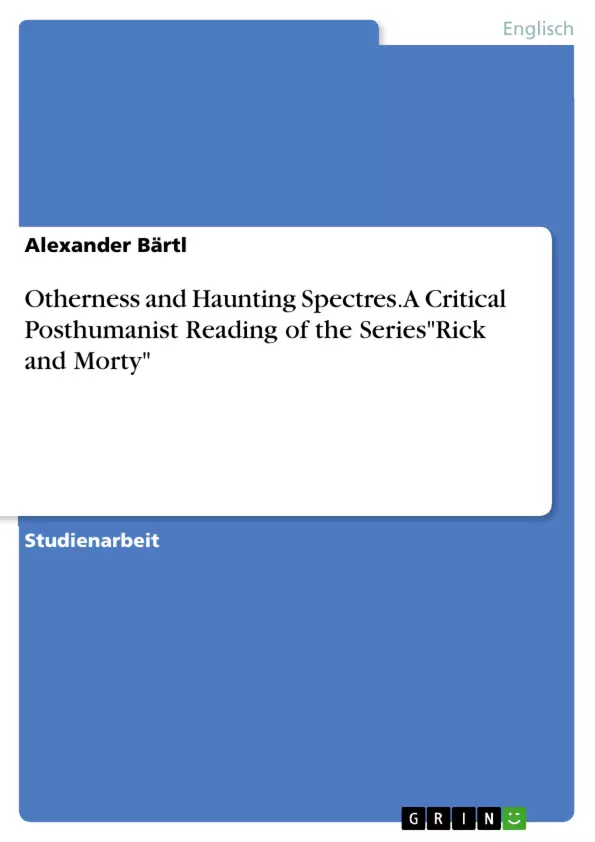For a long time, humans self-evidently considered themselves as the centre of the world and all beings, creating hierarchies among species and within humanity itself. This world view is based on humanist values and conceptions such as ‘otherness’ through which human identify themselves and, apparently, get integrity. Due to various reasons, humanism and its idea(l)s and perceptions are more and more being called into question and criticized. Thus, this paper engages in an approach to have a critical posthuman look at literature. For this purpose, the series Rick and Morty (2013), which has become part of popular culture and reveals numerous posthuman(ist) motives and topics, will be analyzed with regard to the following research question: Is Rick and Morty motivated by a posthumanist drive that permanently questions the dynamics of otherness which underlies humanism?
Following from this, further questions arise and will be dealt with: How is otherness depicted? In which way are otherness and haunting spectres connected with each other? It will be shown that especially through the process of othering, namely, on the one hand, by creating otherness and, on the other hand, by transferring (or imaging) humanist conception to (or via) another species, the very foundation of human(ist) self-conception is being exhibited, reflected, and shattered. Moreover, the analysis will emphasize how Rick and Morty raises criticism and awareness on both humanism and posthumanism, that is its implicit appeal to radically rethink humanist value in order to survive in and (synergetically) connect with an environment and a society that experience radical, especially technological and existential change In literature, posthuman motives and topics can most strikingly be found in the genre of science fiction as it constantly strives to create new worlds and realities within the logics of science and, therefore, reconsiders and engenders criticism on the extratextual world. However, literary texts of science fiction still contain moments, structures, or endings that draw on rather humanist values and expectations, e.g. by dealing with a crisis by humanist means. These literary mechanisms can often only be identified by stepping out of and breaking through the boundaries of a humanist way of reading.
Inhaltsverzeichnis
- Introduction
- Concepts and Methods of Posthumanism
- A Critical Posthumanist Reading of Rick & Morty (2013)
- Creating the Monstrous Other: Between Anxieties and Desires
- The Humanist Non-Humans: The Crisis of the Plutonians
- Conclusion and Outlook
Zielsetzung und Themenschwerpunkte
Diese Arbeit analysiert die Serie Rick and Morty (2013) aus einer kritisch-posthumanistischen Perspektive. Sie untersucht, wie die Serie die Dynamik der Andersheit hinterfragt, die dem Humanismus zugrunde liegt, und wie sie sowohl humanistische als auch posthumanistische Werte in posthumanen Szenarien darstellt. Die Arbeit fragt nach der Darstellung von Andersheit, dem Zusammenhang zwischen Andersheit und Spukgestalten, und der Thematisierung von (den Werten) des Posthumanismus und Humanismus.
- Die Dekonstruktion des humanistischen Konzepts der Andersheit
- Die Kritik an der anthropozentrischen Weltsicht des Humanismus
- Die Untersuchung der Auswirkungen von Technologie und existenziellen Veränderungen auf die menschliche Selbstwahrnehmung
- Die Analyse von posthumanen Szenarien in Rick and Morty
- Die Verbindung von posthumanistischen und humanistischen Perspektiven
Zusammenfassung der Kapitel
Die Einleitung führt in die Thematik der posthumanistischen Kritik des Humanismus ein und stellt die Forschungsfrage nach der posthumanistischen Motivation in der Serie Rick and Morty. Kapitel 2 definiert das Konzept des Posthumanismus und erläutert die Methoden der posthumanistischen Lektüre, indem es auf zentrale Werke von Braidotti, Herbrechter, Fisher und Callus Bezug nimmt. Die Analyse in Kapitel 3 konzentriert sich auf zwei Episoden der Serie, Rick Potion No. 9 und Something Ricked This Way Comes, und untersucht, wie die Serie humanistische und posthumanistische Werte in posthumanen Szenarien konfrontiert.
Schlüsselwörter
Posthumanismus, Andersheit, Spukgestalten, Humanismus, Rick and Morty, Science Fiction, Technologie, Ökologie, Anthropozentrismus, Dekonstruktion, Kritik.
Häufig gestellte Fragen
Wie wird "Rick and Morty" aus posthumanistischer Sicht analysiert?
Die Arbeit untersucht, wie die Serie die anthropozentrische Weltsicht des Humanismus dekonstruiert und die Grenzen zwischen Mensch, Maschine und dem "Anderen" verwischt.
Was bedeutet "Andersheit" (Otherness) in dieser Studie?
Andersheit wird als humanistisches Konzept analysiert, durch das sich der Mensch definiert und Hierarchien schafft. Die Serie hinterfragt diese Dynamik permanent.
Welche Rolle spielen "Spukgestalten" (Haunting Spectres) in der Analyse?
Der Begriff bezieht sich auf die Verbindung von Andersheit und existenziellen Ängsten, die in den posthumanen Szenarien der Serie zum Ausdruck kommen.
Warum eignet sich Science Fiction besonders für posthumanistische Kritik?
Das Genre ermöglicht es, neue Realitäten und technologische Veränderungen durchzuspielen, die die menschliche Selbstwahrnehmung radikal erschüttern und reflektieren.
Welche Episoden werden in der Arbeit genauer untersucht?
Die Analyse konzentriert sich insbesondere auf die Episoden "Rick Potion No. 9" und "Something Ricked This Way Comes".
- Quote paper
- Alexander Bärtl (Author), 2021, Otherness and Haunting Spectres. A Critical Posthumanist Reading of the Series"Rick and Morty", Munich, GRIN Verlag, https://www.grin.com/document/1064229



